How to make Curtido – A fermented Salvadoran Slaw (similar to sauerkraut) made with cabbage, carrots, onion and oregano. Simple to make and FULL of healthy probiotics – use curtido in tacos, with pupusas, quesadillas, burrito bowls or with enchiladas as a delicious healthy side!
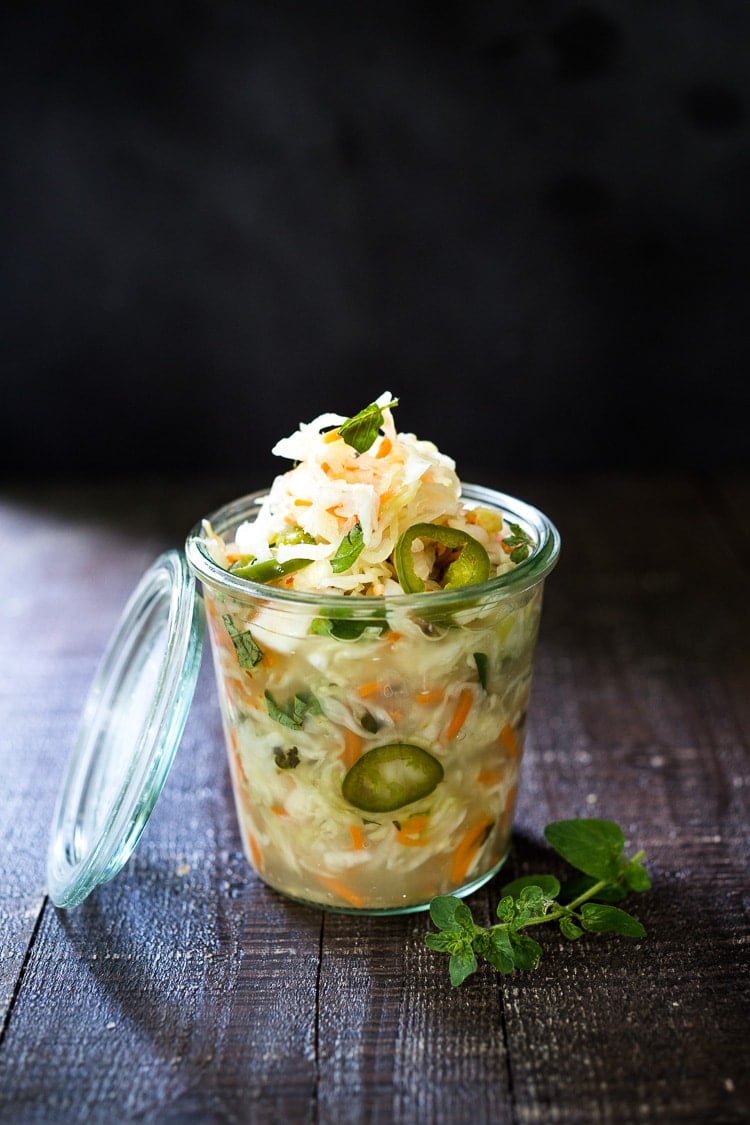
There is a magical synergy that happens in Curtido, our take on a fermented Salvadoran Slaw. The important base of Curtido is cabbage, onion, oregano and fine sea salt. It is hard to describe the end flavor result of light fermentation- other than fresh, clean, crunchy and addicting!
It keeps in the fridge for months and the flavor gets better and better with time. Think of this as a Central American version of Sauerkraut. Delicious on Pupusas, in tacos or as a topping for tostadas, enchiladas, or burrito bowls, Curtido is easy and fun to make.
WATCH HOW TO MAKE CURTIDO! | Video
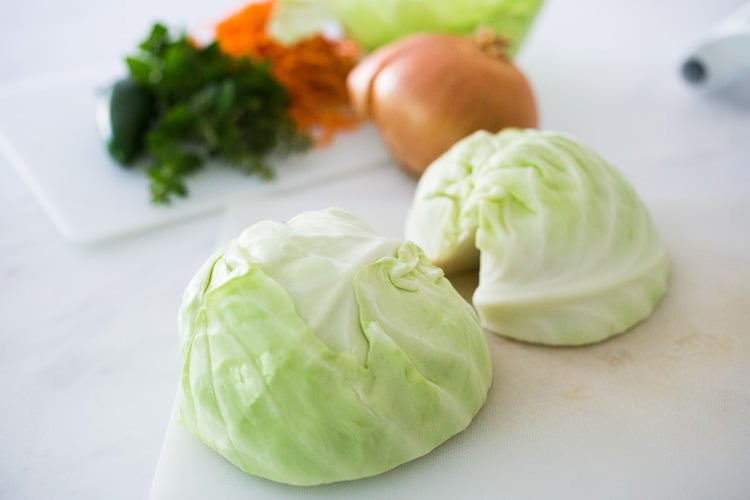
How to make Curtido
Step one
It starts with a medium-sized whole cabbage. Traditionally green cabbage is used, but purple will work well too. You want to use a whole cabbage, not a pre-shredded packaged cabbage which will have less of the good bacteria needed to begin the fermentation process.
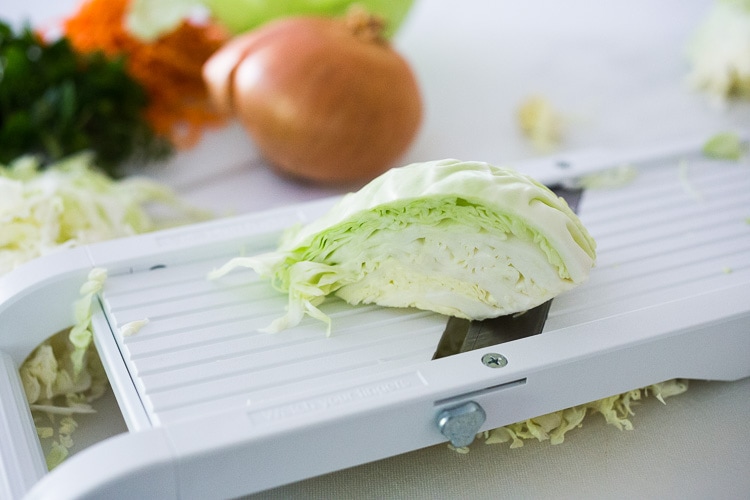
Save a couple of the outer leaves, then core and thinly slice, using a mandolin, food processor (with grater attachment) or sharp knife.
Step two
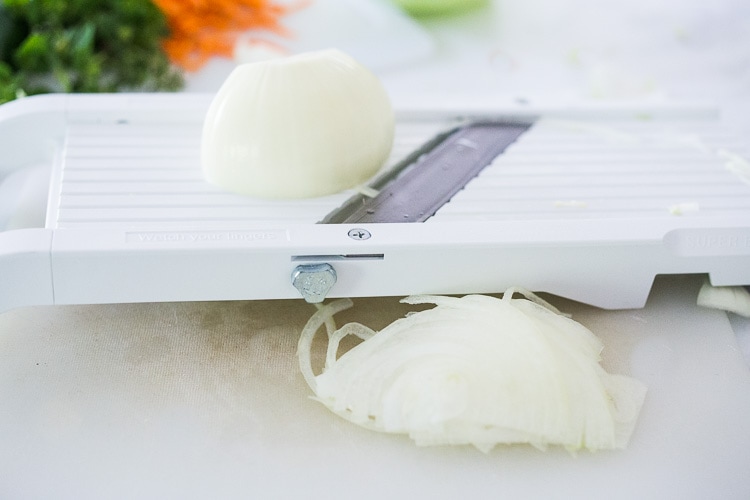
Thinly slice an onion.
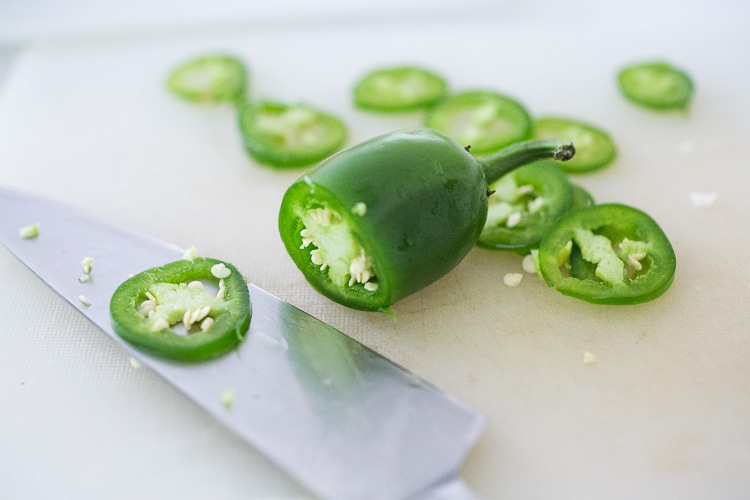
Step three
Thinly slice a jalapeno and grate a carrot. You can also create carrot “ribbons” using a veggie peeler.
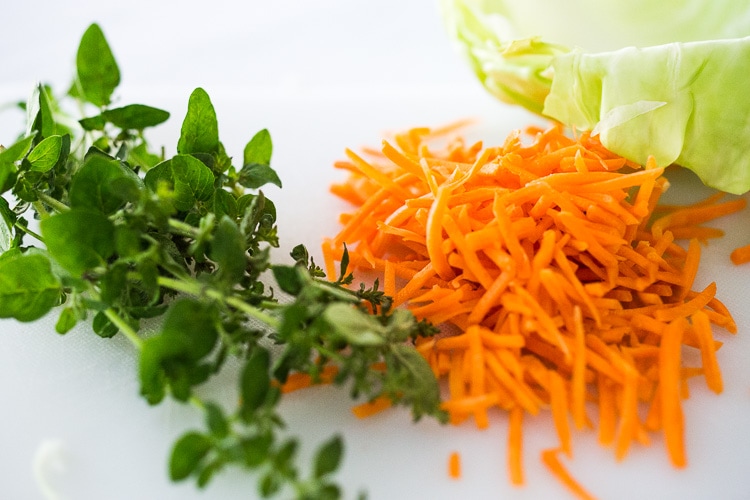
Use fresh oregano if you have it, or dried works fine as well.
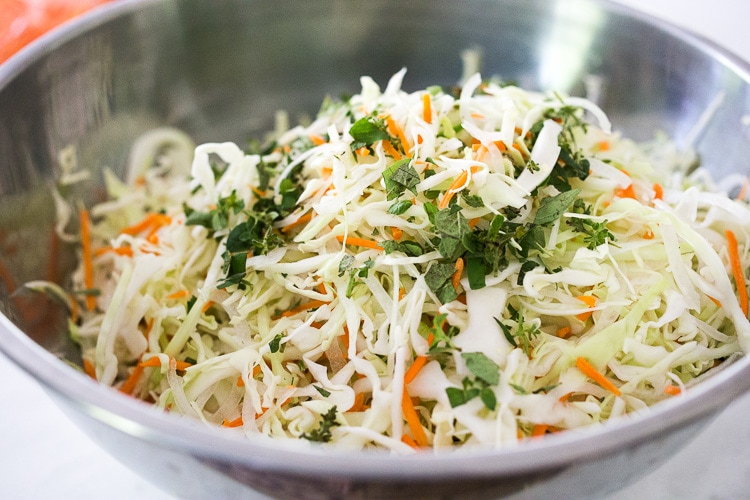
Step 4
Weight the cabbage mixture in grams. Multiply this by .02. This is the number in grams of how much salt you want to aim for. (See recipe notes) For example if your cabbage mixture is 1000 grams, multiply this by .02. This equals 20 grams of salt.
Layer the veggies with fine sea salt and let it sit for 20 minutes or until it starts to release its liquid.
It is important to weigh or measure the salt here. Too much salt will kill ALL the bacteria, which will prevent fermentation. Too little salt, may not kill enough of the “bad” bacteria.
Mix well and pound a little (I use a muddler) to help it release liquid. Let sit another 30 minutes to allow it to get juicy.
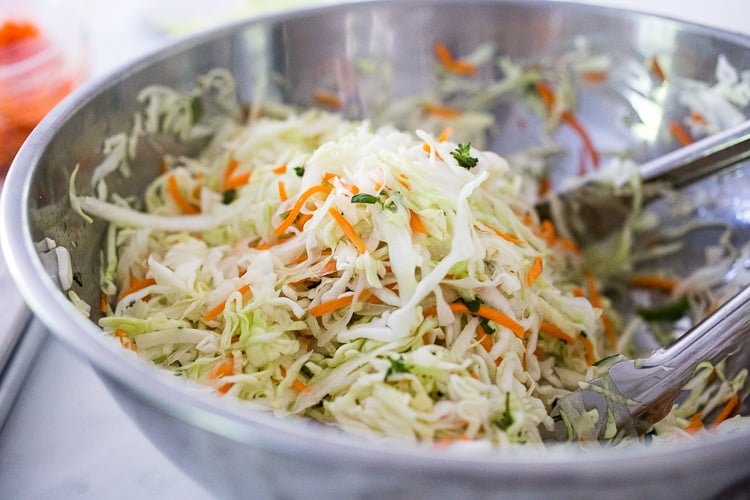
Step five
Pack! Use clean, sterile jars or crocks.
Here I’ve used an extra large, two quart jar. But you could use 2-3 smaller jars. Place jalapeño in the bottom of the jar.
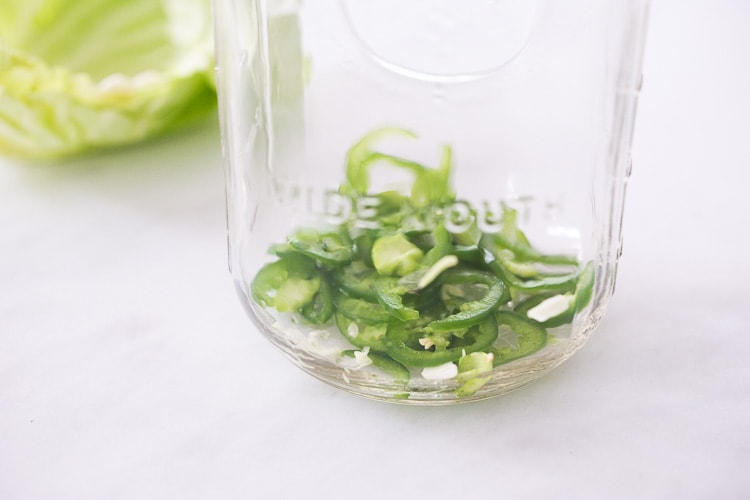
Then pack the Curtido into the jar.
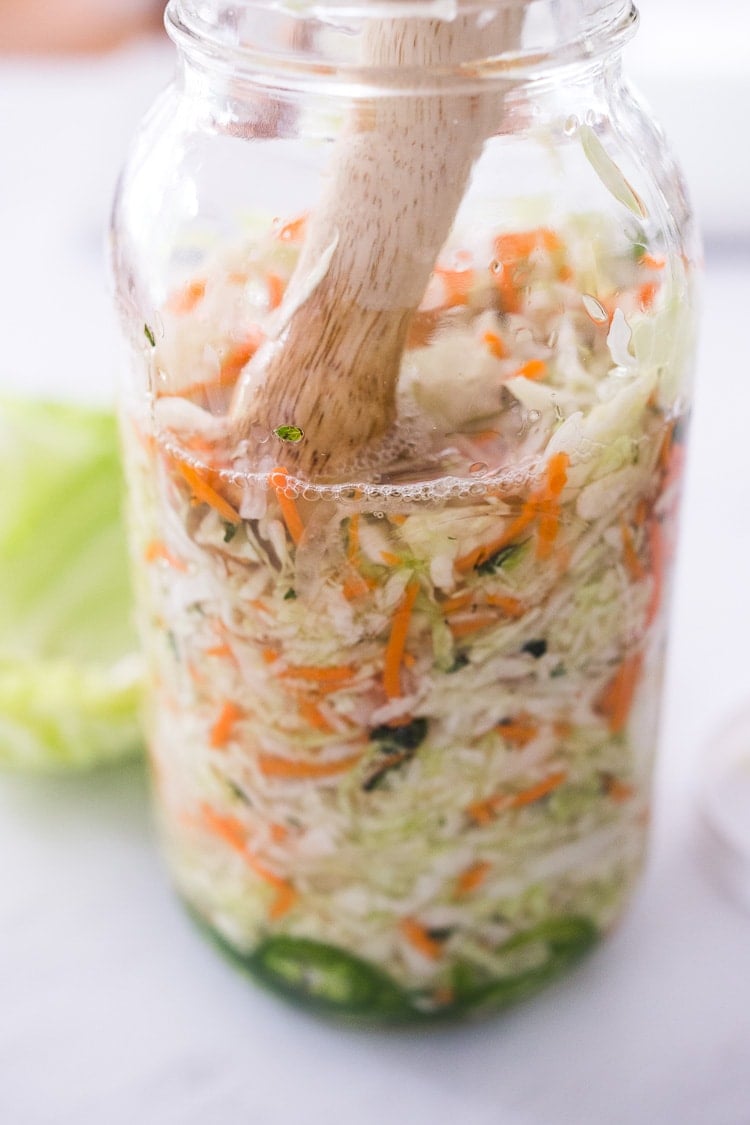
You want enough brine ( saltwater) to cover the slaw completely- so if the slaw seems dry, add a little filtered water. I added a 1/8 cup of water above.
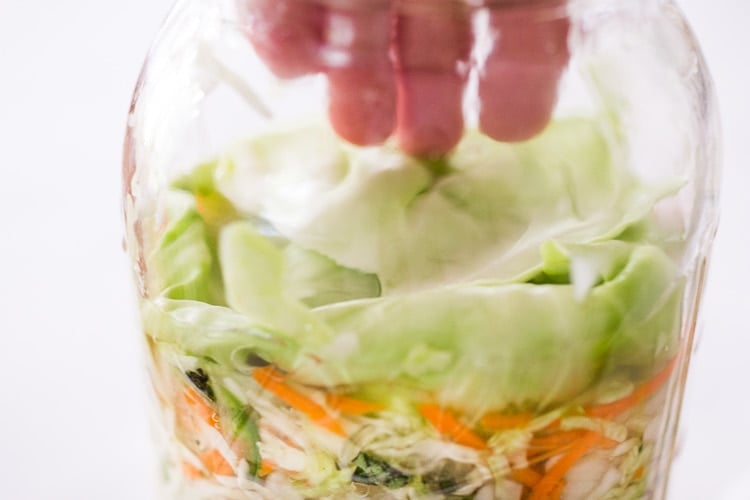
Step six
Cover the curtido with the cabbage leaves, which will help keep the slaw submerged. Press it down then weigh it down so the Curtido stays submerged. You can use a fermentation weight if you like.
Or an easy way to make a weight is to fill a small zip lock bag with water. Seal the bag and place it over the whole cabbage leaves.
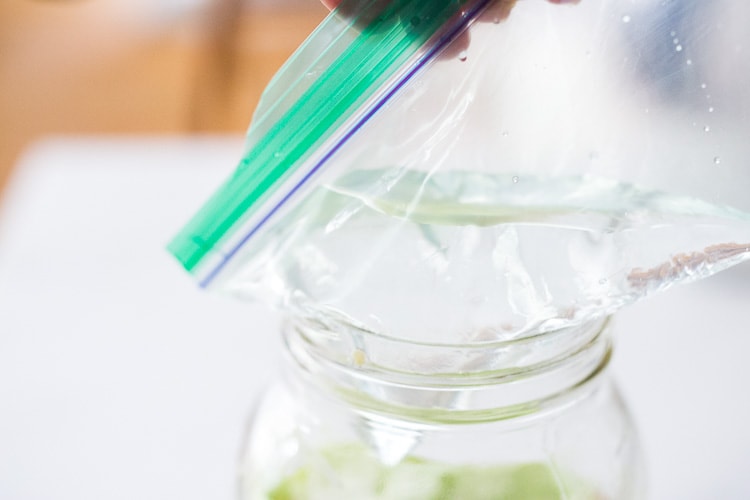
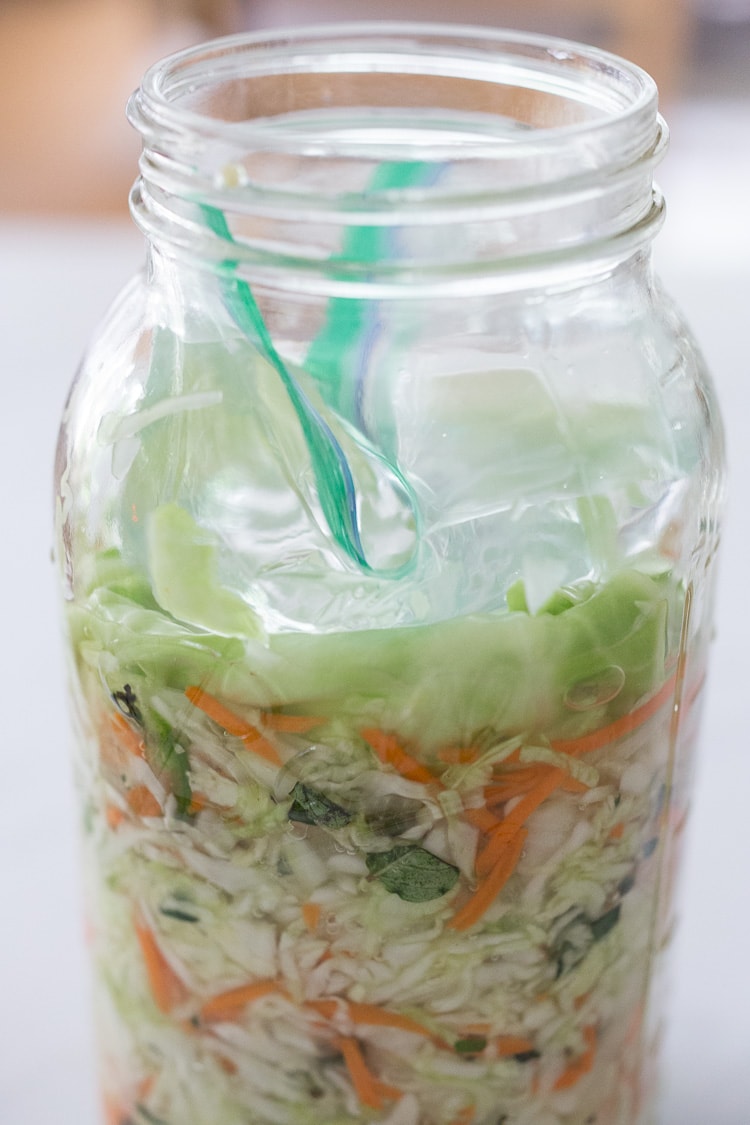
Step seven
Loosely cover the jar, place it in a bowl if you like to catch any juices and set it on the counter 3-5 days. The warmer the weather, the faster the fermentation process with happen.
Check the curtido each day to maintain that slaw is still submerged, pressing down if need be, using a muddler or end of a wood spoon. After about 3 days you will begin to see bubbles, a sign that the bacteria is alive and working its magic.
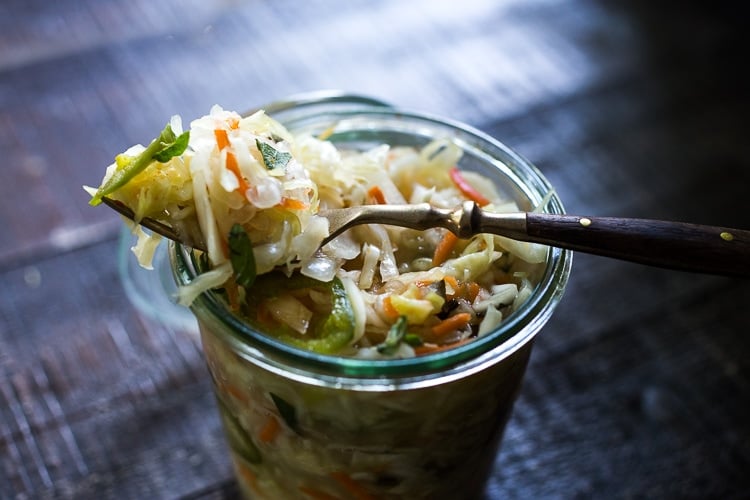
Step eight
Once you see the bubble activity, feel free to store it in the fridge.
It is alive and well and well continues to slowly develop more flavor and complexity for months on end. Just keep the slaw submerged in the brine.
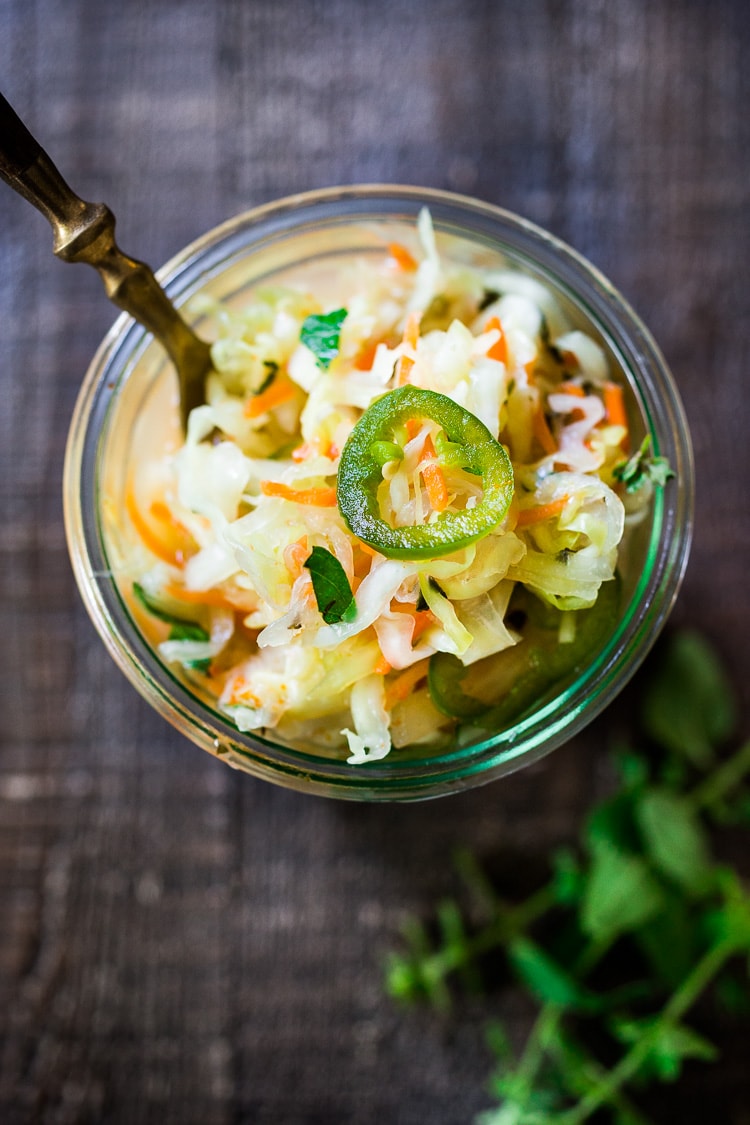
What to serve with Curtido?
Traditionally it is served with Pupusas (Salvadoran Masa Cakes).
We have been using this on everything from tacos, to enchiladas, to black bean burgers! So flavorful and refreshing and adds the best texture!
You could even add it to lunch bowls and buddha bowls as a refreshing side.
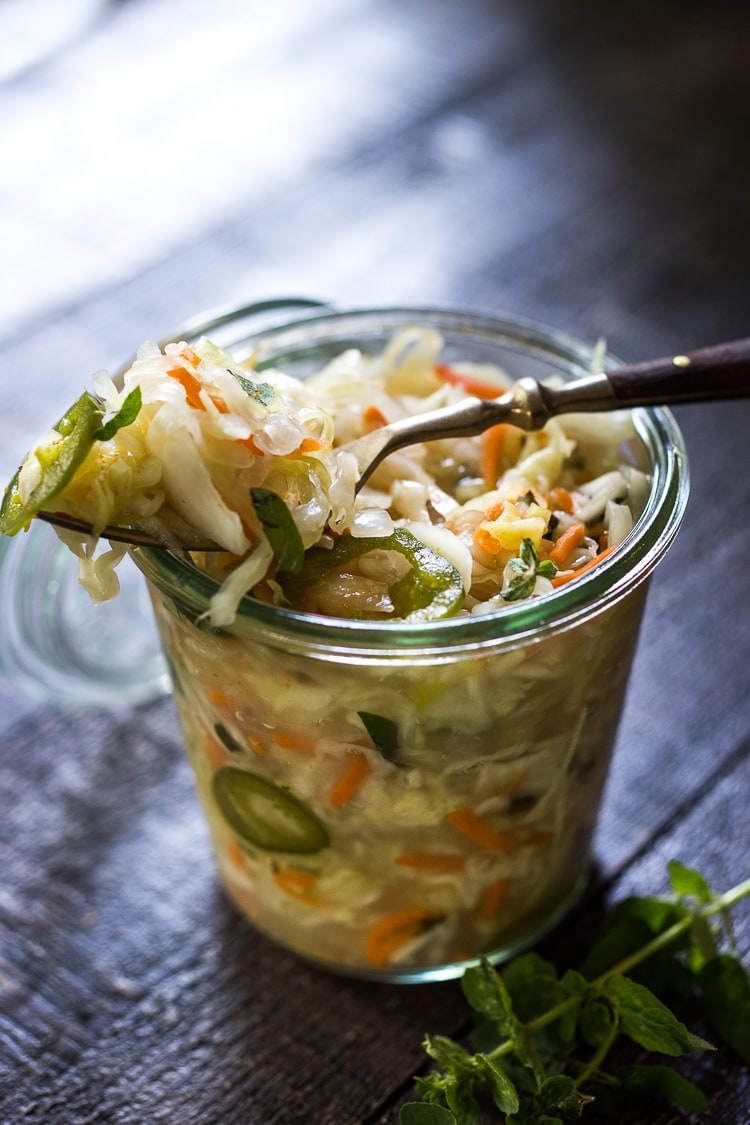
Last night we had some friends over for simple veggie burgers and I had this jar of curtido out along with the condiments.
It was interesting watching it disappear… so delicious on the burgers!
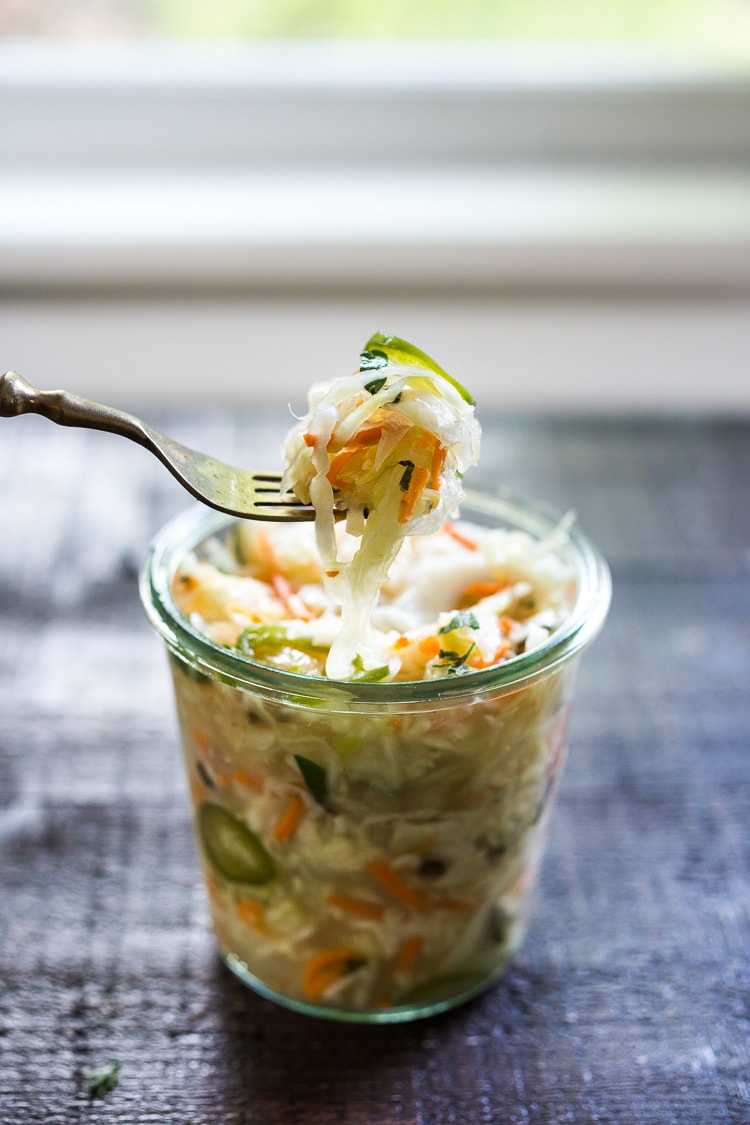
Anyways, this Curtido is for all you fermenters out there! You will love it. Please share how you use it in your everyday meals in the comments below!
More Fermented Recipes!
- Fermented Hot Sauce
- Kimchi
- Beet and Cabbage Kraut,
- Tumeric Kraut
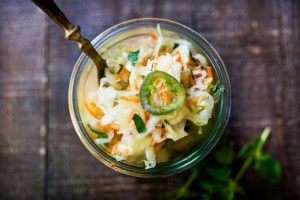
Curtido Recipe -Salvadoran Cultured Slaw
- Prep Time: 60
- Total Time: 60
- Yield: 4 cups
- Category: Fermented, Cultured
- Method: Fermented
- Cuisine: South American
- Diet: Vegan
Description
Ingredients
- 1 medium head of green cabbage (about 2 lbs)
- 1 medium yellow onion
- 1 cup carrot shreds, optional
- 1 tablespoon oregano, dried (1/4 c chopped fresh)
- 1 1/2 tablespoons fine sea salt
- 1 jalapeno, sliced in rings (or 1/4-1/2 t chili flakes) optional
Instructions
- Take off a few outer leaves of the cabbage and set them aside. Finely shred or chop cabbage with a mandolin, food processor (with slicing disc) or sharp knife.
- Thinly slice the onion in half rings. Shred carrots with a grater or using a veggie peeler to create long flat strips.
- In a large bowl, place the ingredients ( veggies, herbs, onions, and salt)-all except the jalapeno and mix well. Let sit for about 10 -20 minutes allowing the veggies and salt to merge and extract the natural juices. Use a pounder, large pestle, or your hands to macerate the mixture.
- Distribute jalapeno rings in the bottom of the jars (or chili flakes, if using) and then fill up the jars with the cabbage mixture packing tightly, pressing down with the pounder, leaving a 1 or 2-inch space at the top. It should be juicy.
- It is important that the cabbage is completed covered with the liquid. You can add a little brine (salted filtered water) if the cabbage seems dry. (Brine= 1 teaspoon sea salt per cup of water) Packing in a cabbage leaf on top of the mixture can help keep the mixture submerged. Alternatively, you can use a fermentation weight or tuck in a sandwich-sized zip lock bag on the top ( fill with water and zip close). This creates a good weight and barrier. Cover the top with a cheesecloth or a loose lid.
- Leave on the counter at room temperature for 3-5 days, checking daily to make sure cabbage is still under liquid, packing down again if need be. You will start to see tiny bubbles rising up from the bottom this means the culturing is happening. Culturing happens faster in warmer weather.
- Refrigerate, keeping the curtido submerged under the brine. It will continue to develop flavor and complexity over time. Curtido will keep for many many months, as long as it is submerged under the brine.
Notes
Salt Ratio: The recommended salinity for Sauerkraut is 1.5% – to 2.5% salt to the weight of the cabbage. Here we use 2% salt to the weight of the cabbage. Example: 1ooo grams cabbage multiplied x .02= 2o grams of salt. Feel free to use more or less as long as it stays between 1.5% and 2.5%. I use Himalayan Sea Salt and Real Salt. Both are natural and unrefined with high mineral content.Use a ratio of 1 teaspoon sea salt per cup of water, if you need to add more brine.
Nutrition
- Calories: 30
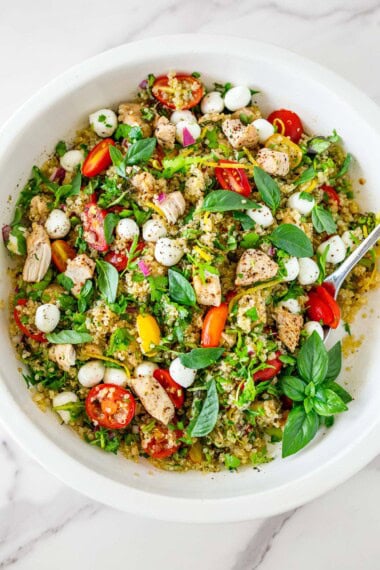
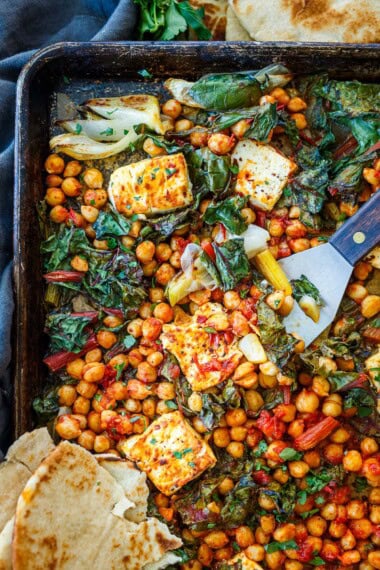
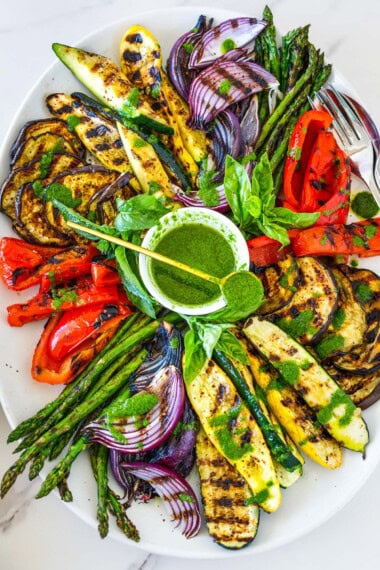

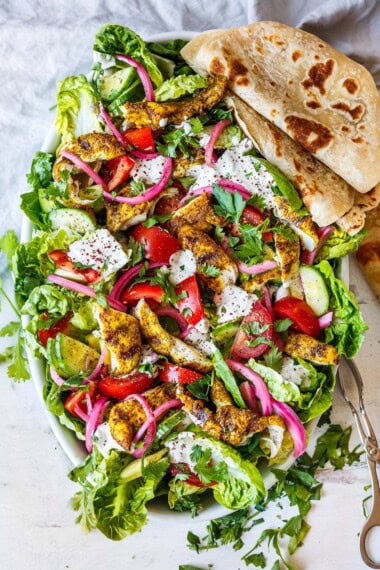

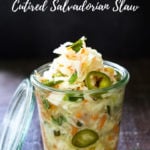
I spent several years of my childhood in El Salvador and as soon as I started mixing the ingredients the smell took me back! I made mine in a 2 qt fermentation crock and left it 5 days. We have eaten it on anything with Latino flavors and also enjoyed it on simple foods like eggs. I have made sauerkraut as well, but I think I prefer the complexity of curtido as my go-to ferment to have on hand.
I love this so much too!
I’ve made sauerkraut for many years, but now this is interesting using oregano. I just finished making and so waiting for the finished result.
Thank you for this recipe.
Let us know what you think- I love the oregano in this recipe!
Love fermented and/or pickled curtido. I use Mexican oregano in both versions, with fresh lime juice in the ferment, and apple cider vinegar in the pickle. No additional water in either of mine. Just the liquid extracted from the veggies by the salt. Both are delicious, and I use them as a condiment on lots of different foods.
Thanks for sharing MsLinda!
I need to make this! Please tell me where you got your square jars please. They look very cool😁
I think I got the jars on Amazon. 🙂
I don’t understand putting half the ingredients in a bowl and then putting the other half of the ingredients in the bowl. That amounts to putting all the ingredients (except the jalapeño) in the bowl. Why specify doing it 1/2 at a time? I don’t get it.
You could have written, “Put all ingredients except jalapeño in a bowl.”
Hi Michael- sorry about that. I see your point and updated the recipe. 🙂
Thanks, I will have a look!
Haven’t tried it, but it looks easy and healthy
There are several versions of curtido. You may also add some thin slices of beets to it. Curtido is a must for pupusas along a thin tomato sauce. I should mention that in the original Salvadoran version some vinegar is added to the water. It can be used since the day it is made.
Interesting, and good to know!
Surprisingly simple to make . I let mine ferment 7 days . It turns out crispy and delicious. I usually make it with crushed red pepper , but the batch I made tonight was made with jalapenos. I’m anxious to try it…… but, I have too wait 7 days !
nice Tom! hope you enjoyed with the jalapeños!
Gracias por tan buena receta¡¡¡
This is so delicious and has become my family’s addiction. I make it and distribute it to my sons and their wives and we eat it with everything. My only question: Why is the lid left loose? Does it matter if it is tightened? I notice if I don’t leave much space at the top of the jar liquid eventually oozes out. Thanks again for a great recipe.
The gases need to escape or it could break the jar
What is the brine? Why wouldn’t you post the brine?
The brine is saltwater. See the recipe notes. 🙂
You left out the cider vinegar. Curtis is pickled not fermented, I am from El Salvador and we never leave the vinegar out.
One question about your terminology— why are you calling it South American? El Salvador is in the Northern Hemisphere and part of North America. Also, it should read “Salvadoran” not “Salvadorian”
Oh dear. You are right Emily, it is not in South America, it’s in Central America. Thanks for pointing this out. Fixed. Appreciate this so much.
My family is from El Salvador. We say we are Salvadorean/Salvadorian. Non of my friends with motherland ties pronounce it Salvadoran. Seems to be an American way to pronounce it.
Just an FYI.
Salvadoran is the academic way to say and pronounce it right, but all of us with ties or family born there call ourselves Salvadorian or Salvadorean. So either way is correct.
El Salvador is Central America.
I’ve had this sitting on the counter for 4 days but there are no bubbles. What to do?? What did I do wro?
Hummmm, none when you tap the jar? What is the temp in your home?
Hi, thank you for the recipe! A couple of questions: If it’s too salty, what do you recommend doing to offset that?
I put my curtido in the fridge after three days, but now the brine has absorbed and the veggie mix isn’t fully covered. Should I add filtered water to cover them? If not, what do you recommend? 🙂
Yes you could add filtered water to cover, adding 1 teaspoon sea salt per cup of water.
Great recipe, family love it.
Thank for the post.
Thanks for the nice recipe post Sylvia, fermentation has always been my favorite thing to do in the kitchen and it’s great to try something new!
It’s been so long since I’ve seen you and Tonia, I hope you are doing well 🙂
Hey Doug! Great to hear from you!!! We are both doing well, how are you? It has been such a long time. Miss seeing you in the old Mizuna days. I love this recipe of Tonia’s- it’s so tasty! Give it a go, very similar to kraut! All the best and thanks for reaching out!!
How do you make your brine? It is just the water from the veggies and salt or do I need to add vinegar?
Yes, just the water released from the cabbage that has been salted. No vinegar. If it seems too dry you can add a little filtered water. But the delicious tangy quality comes from the fermentation, not from the vinegar. Hope this helps!
Yes thank you!
Can this be made without the onion?
Yes, certainly!
Love this!
I’m so happy with the way this tastes! And so versatile! It adds the perfect zip to simple dishes.
I find myself craving it and you may catch me eating it straight out of the jar…
Thank you!
This turned out so good!
When it is time to place in the refrigerator, do you then put a lid on ? Either loose or tight ?
Yes, place a lid on it – in between loose and tight. 🙂
Sounds delicious, especially on tacos…What is a muddler?
A thick wooden stick used to muddle drinks.;)
I was looking for a slaw recipe for the whole family and I stumbled on this article. I read and followed the instructions carefully and I made it deliciously! Every member of my family is so happy! Thanks for this!
I’m so glad you liked it!